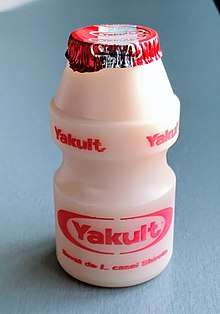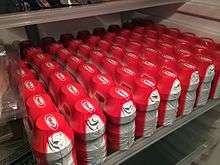Yakult
 A single serving of Yakult | |
| Type | drink |
|---|---|
| Manufacturer | Yakult Honsha |
| Distributor | Yakult Honsha |
| Country of origin | Japan |
| Introduced | 1930s |
| Colour | off-white |
| Ingredients | Ingredients |
Yakult (ヤクルト Yakuruto) is a probiotic milk beverage fermented with the bacteria strain Lactobacillus paracasei Shirota, first isolated from the human intestine by Japanese scientist Minoru Shirota in the 1930s and sold by Yakult Honsha.
Ingredients
Yakult is sold in 65 mL containers. The ingredients are water, skimmed milk, glucose-fructose syrup, sucrose, citrus aroma, and live Lactobacillus paracasei Shirota bacteria.[1] The strain was originally classified as being Lactobacillus casei but in 2008 it was reclassified as belonging to L. paracasei.[1]
Yakult is prepared by adding glucose and glycine to skimmed milk, and heating the mixture at 90 to 95 °C for about 30 minutes. After letting it cool down to 45 °C, the mixture is inoculated with the lactobacillus and incubated for 6 to 7 days at 37 to 38 °C. After fermentation, water, sugar, gums and lactic acid are added.[2]
Health claims
In 2006, a panel appointed by the Netherlands Nutrition Centre to evaluate a marketing request by Yakult found there to be sufficient evidence to justify claims that drinking at least one bottle of Yakult per day might help people who tend to be constipated to have regular bowel movements, and might help maintain a healthy population of gut flora.[3]
In 2010, an EFSA panel denied a request by the company to market Yakult as maintaining upper respiratory tract defenses against pathogens (in other words, protection against diseases like the common cold), finding the claim not supported by the evidence.[1]
In 2013, the UK Advertising Standards Authority disallowed an advertisement for Yakult in response to a complaint. It found that while there was sufficient evidence for the claim that "significant numbers of viable [Lactobacillus] survived transit to the gut [after consumption of Yakult]", the advertisement had made claims of general health benefits without providing a specific, referenced claim, as required.[4]
Commercialisation

Yakult was invented in the 1930s in Japan by Minoru Shirota in the 1930s and he helped found Yakult Honsha in order to commercialize it.[5] In some countries, including Japan, India and Brazil, it is sold door-to-door. It was first sold in the Anglophone world in the 1990s, with Australia selling it first in 1994, the UK in 1996, and the US in 1999.[6]
In February 2018, it was reported that Danone planned to sell €1.5 billion of its Yakult investment, reducing its stake from 21% to 7%.[7][8] The plan was followed by a decline in Yakult's share value.[9] Danone had first bought shares in Yakult in April 2000.[9] The sale was completed in March 2018.[10]
In September 2018, it was reported that the appearance of unlabelled Yakult bottles in To All the Boys I've Loved Before led to a rise in the drink's sales that coincided with a 2.6% increase in share price following the film's release on 17 August.[11][12]
References
- 1 2 3 EFSA Panel on Dietetic Products, Nutrition and Allergies (October 2010). "Scientific Opinion on the substantiation of a health claim related to Lactobacillus casei strain Shirota and maintenance of the upper respiratory tract defence against pathogens by maintaining immune defences pursuant to Article 13(5) of Regulation (EC) N". EFSA Journal. 8 (10): 1860. doi:10.2903/j.efsa.2010.1860.

- ↑ Jost, Rolf (2007), "Milk and Dairy Products", Ullmann's Encyclopedia of Industrial Chemistry (7th ed.), doi:10.1002/14356007.a16_589.pub3, ISBN 978-3527306732
- ↑ "Assessment Report: Yakult". Netherlands Nutrition Centre. November 10, 2006.
- ↑ "ASA Adjudication on Yakult UK Ltd". Advertising Standards Authority. 15 May 2013. Retrieved 8 September 2018.
- ↑ Caramia, Giuseppe; Silvi, Stefania (2011). "Chapter 1: Probiotics: From the Ancient Wisdom to the Actual Therapeutical and Neutraceutical Perspective". In Malago, Joshua J.; Koninkx, Jos. F. J. G.; Marinsek-Logar, R. Probiotic Bacteria and Enteric Infections Cytoprotection by Probiotic Bacteria. Dordrecht: Springer Science & Business Media. p. 6. ISBN 978-9-4007-0386-5.
- ↑ Cocozza, Paula (5 September 2018). "The cult of Yakult: the surprising reason the world's gone wild for the probiotic drink". The Guardian. Retrieved 8 September 2018.
- ↑ Kar-Gupta, Sudip; Vidalon, Dominique (14 February 2018). "Danone to sell $1.9 billion Yakult stake in quest to boost shareholder returns". Reuters. Retrieved 8 September 2018.
- ↑ "Danone to Sell Stake in Japan's Yakult for $1.8 Billion". Bloomberg. 14 February 2018. Retrieved 8 September 2018.
- 1 2 Gretler, Corinne (14 February 2018). "Yakult Declines After Danone's $1.8 Billion Share Sale Plan". Bloomberg. Retrieved 8 September 2018.
- ↑ "Danone completes 1.3bn euro sale of its 14% stake in Yakult". FoodBev Media. 28 March 2018. Retrieved 8 September 2018.
- ↑ Petter, Olivia (4 September 2018). "Yakult shares increase following release of Netflix's 'To All the Boys I've Loved Before'". The Independent. Retrieved 8 September 2018.
- ↑ Balji, Divya (3 September 2018). "Netflix Teen Comedy Helps Yakult Yogurt Drink Fly Off Shelves". BloombergQuint. Retrieved 8 September 2018.
External links
| Wikimedia Commons has media related to Yakult. |